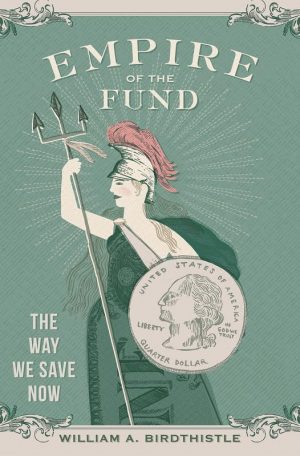Empire Of The Fund: An Interview With William Birdthistle(Or: 4 Tips For Lawyers On Saving For Retirement)
An important new book addresses our nation's retirement income security crisis -- and contains investment advice too.
 What should Biglaw associates do with their recently increased base salaries? They can splurge a little or make some (tax-deductible) charitable contributions, for starters. But I’d also recommend putting some of the money toward retirement savings (especially if their firm gives them a strong incentive to do so).
What should Biglaw associates do with their recently increased base salaries? They can splurge a little or make some (tax-deductible) charitable contributions, for starters. But I’d also recommend putting some of the money toward retirement savings (especially if their firm gives them a strong incentive to do so).
Millions of Americans, including many with high incomes, have not saved enough for retirement. Nor do they have the time or expertise to successfully manage the money they do have packed away — a key theme discussed by Chicago-Kent law professor William A. Birdthistle in his new book, Empire of the Fund: The Way We Save Now (affiliate link).
Ron Lieber of the New York Times described Empire of the Fund as “a lively new book critical of our flawed system of saving.” Writing in the Huffington Post, corporate governance guru Nell Minow wrote, “If I could assign every politician running for office this year one book to read, it would be Professor William Birdthistle’s Empire of the Fund: The Way We Save Now, the story of the avalanche of money poured into mutual funds and the staggering inadequacy of the results as the baby boomers approach retirement.” The book has also received coverage in Forbes, Bloomberg View, and the Chicago Tribune.

Is The Future Of Law Distributed? Lessons From The Tech Adoption Curve
I’ve been chatting with Professor Birdthistle — who is, full disclosure, my former co-clerk and longtime friend — about the ideas presented in his book. Here’s a (lightly edited and condensed) account of our conversation.
DL: Congratulations on Empire of the Fund, William! You talk a lot in the book about the problem of losing the forest for the trees, with investors buried in data and details and disclosures but lacking the most salient information. So to start off, let me ask you: what would you say is the overarching message or theme of the book?
WB: Thanks very much, David. The book has two audiences, and its overarching message is slightly different for each. For individual investors, the message is a warning: investment funds, even pedestrian mutual funds, are not charitable institutions and they will try everything possible to extract as much revenue from your life savings as possible within (and sometimes beyond) the confines of the law and the market — so be vigilant and beware.
For policymakers, the message is a plea: changing our system of saving from defined benefit plans (pensions) to defined contribution plans (401(k)s) has shifted a huge amount of responsibility onto the backs of millions of investing amateurs, who have been given almost no training or tools to succeed — so provide financial literacy and good investment options or brace for widespread failure.
Sponsored

The Business Case For AI At Your Law Firm


Is The Future Of Law Distributed? Lessons From The Tech Adoption Curve

Navigating Financial Success by Avoiding Common Pitfalls and Maximizing Firm Performance

Legal AI: 3 Steps Law Firms Should Take Now
DL: Let me play devil’s advocate for a second. The money in my 401(k) is my money; I earned it. Why should anyone else care what I do with it?
WB: If someone wants to squander their savings, what business is that of ours? I’m very sympathetic to that libertarian objection. But, as with smoking, other people’s self-destructive habits become our business when we have to pay for them. And if large swaths of Americans botch their retirement savings, the odds are high that they’ll ask the rest of us to pay for the error. Either directly, though a bailout; or indirectly, through more funding for government programs to support the elderly or indigent.
DL: Fair enough; we’ve seen similar arguments raised in the context of health insurance, for example. So if we accept that we as a society should be concerned about how individuals handle their retirement money, what can be done to encourage responsible investing?
WB: I suggest that we require financial licenses for any investors who wish to direct their 401(k) savings into any actively managed funds. Those funds — unlike much cheaper index or target-date funds, which are typically default options in 401(k)s — suffer from high fees without improving performance. A licensing regime would force those investors to learn about the problems with those funds, would warn them of their dangers, and would encourage them to stick with more prudent index funds. Who would pay for it? We could ask the investment industry to pay, since fund advisers earn far higher fees from those funds. Isn’t this too much government involvement in personal saving, one might ask? This suggestion, I would argue, is just a tweak on the 401(k) system, which is already an entirely governmental plan that provides tax benefits in exchange for compliance with requirements.
Sponsored

Legal AI: 3 Steps Law Firms Should Take Now

Early Adopters Of Legal AI Gaining Competitive Edge In Marketplace
DL: Many of our readers here at Above the Law work for large law firms or successful boutique firms, and they are fortunate enough to have extra income to put toward their retirements. But these lawyers, while smart and talented at practicing law, are not necessarily experts on investing. If you could offer a few tips on how to save for retirement, what would you tell them?
WB: I remember my time at a firm, and I know that toiling and tracking billable hours doesn’t leave much spare time to obsess about a long-term problem. So here are four tips to follow with personal investing, if you can: first, max out your contribution to a 401(k) to ensure that you get the full benefit of your firm’s match; second, find the cheapest target-date fund you can put your savings into (either from your 401(k) menu or the wider investing universe if your plans allows you); third, avoid all temptations to time market rallies or falls, to get cute with ETFs or other exotica, or to take money out of your 401(k) for anything other than a true emergency; and fourth, once a year, check to see whether your investments are still among the cheapest you can find. With mutual funds — unlike haircuts and tacos — cheaper really is better.
DL: I’m interested to hear you mention target-date funds; in the book, you sound some cautionary notes about them.
WB: I think target-date funds are a very sound idea for many investors, particularly those without much interest or expertise in investing. But here are three things to worry about. First, fees. Yes, fees are always a concern for every fund investment, but since target-date funds intend for you to set them and forget them (like a Ronco Rotisserie), an expensive fund could hurt you badly if the high fees compound to your detriment over several decades. And though target-date funds have a good reputation, their average fee is 74 basis points, which is much higher than index or even equity funds — so find one with low fees. Second, make sure you know whether your fund is attempting to get you to the target date or through that date to . . . your more permanent retirement. Since Americans live almost two decades after they retire, a through fund might be notably more aggressive than a to fund. Third, consider whether your target-date fund’s “conservative” allocations really are conservative; many switch to bonds in later years, for instance, but plenty of smart people question whether bonds really have a conservative future. All in all, keep an eye on your target-date fund; even the Ronco manual (on page 4) says not to take “set it and forget it” literally — “use caution and check on your rotisserie from time to time.”
DL: It sounds like we all have to have faith that our fellow citizens are going to get a lot of math and investment decisions right over several decades. Is there a better tool we could give them? Should we go back to pensions?
WB: I don’t really think pensions are a viable option in the near future: entities that guarantee certain payouts have a tendency to overpromise and underfund, which is why pensions are almost extinct in the private sector, why public governments are in so much financial distress, and why Social Security needs vigilant protection. Instead, I think we should give all Americans the option of investing in an excellent defined contribution plan — ideally, one with a few prudent investment choices, an expert investment adviser, and really low rates. Happily, just such a plan already exists and works for millions of Americans: the Thrift Savings Plan is the federal government’s retirement plan with 4.8 million participants and $450 billion in assets. The TSP offers just ten funds (5 target date funds and 5 other conservative choices), it’s run by the massive private sector adviser, BlackRock (so this isn’t government work), and it features unbelievably low fees of less than 3 basis points (a fraction of what ordinary investors can find anywhere else). If we opened the TSP to everyone, millions more Americans could enjoy an extremely competitive plan, including the unemployed, the self-employed, and those employed at small businesses (which might prefer not to have to offer their own plan). That’s a pretty simple tool that already exists and already works.
DL: The simplest solutions are often the best. Congratulations once again on Empire of the Fund, and thanks for the insights!
Empire of the Fund: The Way We Save Now [Amazon (affiliate link)]
David Lat is the founder and managing editor of Above the Law and the author of Supreme Ambitions: A Novel. You can connect with David on Twitter (@DavidLat), LinkedIn, and Facebook, and you can reach him by email at dlat@abovethelaw.com.








